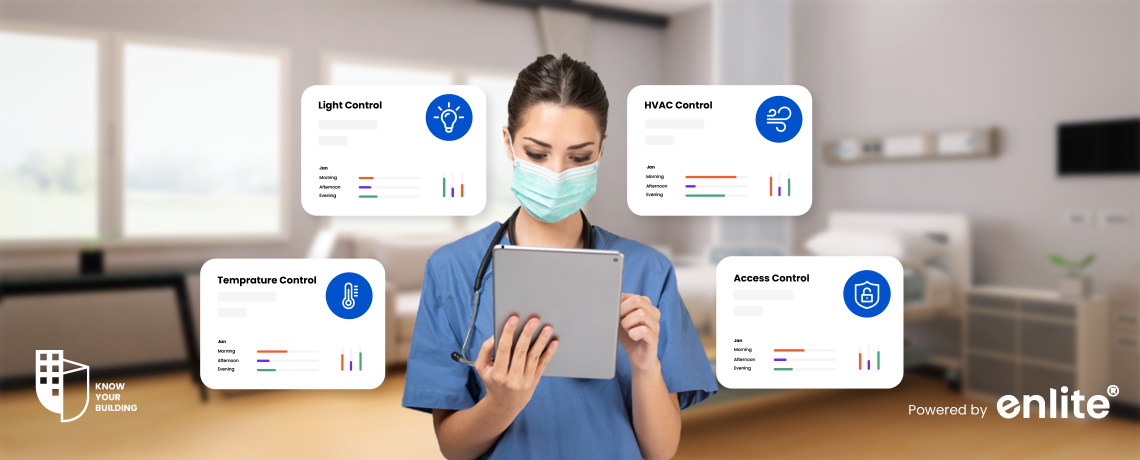Table of Contents
ToggleIn healthcare facilities, patient safety is of paramount importance. While medical expertise and advanced equipment play a crucial role in ensuring the well-being of patients, there is an often-overlooked component that contributes significantly to their safety—Building Management Systems (BMS). These systems offer comprehensive solutions to manage and monitor critical aspects of healthcare facilities, from maintaining optimal environmental conditions to ensuring the security of infrastructure. Let’s explore how advanced BMS can improve patient safety and streamline healthcare operations.
The Role of BMS in Healthcare Facilities
A well-designed Building Management System ensures that various building services are integrated and optimized to create a safe, comfortable, and efficient environment. Here are some key areas where BMS plays a critical role in healthcare settings:
1. Environmental Control and Air Quality
Healthcare facilities must adhere to strict environmental standards to prevent the spread of infectious diseases. A BMS can monitor temperature, humidity, and air quality in real-time, ensuring that the indoor environment remains within required parameters. With effective air filtration systems, BMS can help in reducing contaminants and airborne pathogens, directly improving patient safety.
2. Energy Efficiency and Reliability
A BMS not only helps manage energy consumption efficiently but also ensures that vital systems, such as lighting, HVAC, and power supply, are functioning seamlessly. Hospitals rely heavily on uninterrupted power to keep life-saving equipment operational. BMS can monitor backup generators and other power systems to minimize any risk of downtime, ensuring that critical healthcare services are always available.
3. Fire and Safety Systems
Fire safety is a crucial concern in healthcare facilities. A BMS integrates fire detection and suppression systems to provide immediate alerts in case of any potential fire hazards. These systems can automatically trigger alarms, activate sprinklers, and notify emergency responders, minimizing the risk of injury or fatalities during a fire emergency.
4. Water Management
In healthcare settings, maintaining clean and safe water is vital for both patient hygiene and the operation of medical equipment. A BMS can monitor water systems for leaks, pressure, and temperature, ensuring the water supply is safe and uninterrupted. Additionally, early detection of water leakage helps in preventing mold growth and maintaining sanitary conditions, which is crucial for infection control.
5. Security and Access Control
Hospitals are sensitive environments, where the movement of staff, patients, and visitors must be carefully managed. BMS integrates with security systems to monitor surveillance cameras, control access to restricted areas, and ensure that unauthorized individuals cannot enter critical spaces such as operating rooms, ICUs, or medication storage areas. By enhancing the overall security, BMS plays a vital role in protecting both patients and healthcare personnel.
6. Predictive Maintenance
Predictive maintenance powered by BMS ensures that all building systems—such as HVAC, electrical, and plumbing—are monitored for wear and tear. By detecting potential issues before they become major problems, BMS reduces the chances of equipment failure, which could otherwise compromise patient safety. This proactive approach minimizes disruptions and ensures that healthcare services run smoothly.
The Benefits of Advanced Wireless BMS for Healthcare
BMS for Healthcare Sector
Advanced wireless Building Management Systems offer a significant upgrade over traditional BMS solutions. Wireless systems are easier to install and maintain, allowing for seamless upgrades without the need for invasive construction work. Moreover, wireless BMS can be monitored remotely, offering real-time insights and alerts, which is particularly valuable in large healthcare facilities.
Conclusion
Ensuring patient safety in healthcare facilities is a multi-faceted challenge that requires attention to both medical care and the built environment. Building Management Systems provide essential support by ensuring optimal environmental conditions, preventing hazards, and enhancing operational efficiency. With the advent of advanced, wireless BMS technology, healthcare facilities can now achieve higher standards of safety and performance.
Take your healthcare facility’s safety to the next level with “Know Your Building”—the world’s first cloud-native wireless Building Management System.














